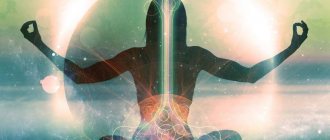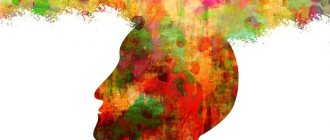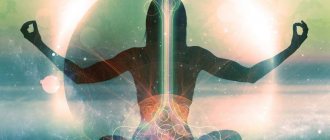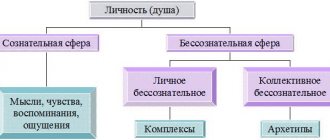What is self-awareness
What does self-awareness mean? This can be literally translated as “knowing oneself” or “knowing oneself.” The term comes from philosophy. It is no longer possible to say exactly who introduced this concept, but in psychology it is associated with the name of L.S. Vygotsky. This is what the author calls knowledge about himself: “a person’s awareness of himself as an individual, the focus of a person’s consciousness on himself: on his own body, needs, feelings, behavior.”
Let’s explain the concept of self-awareness in simple words, give a definition from psychology, and outline the main characteristics. In psychology, a person’s knowledge of himself is the subject’s awareness of himself as a separate unit, personality, participant in society and understanding of his place in the world.
What parts does a person's knowledge of himself consist of? From a person’s awareness and assessment of his thoughts, behavior, desires. It is connected with many other “itself”:
- self-esteem;
- self-esteem;
- self-worth;
- self-help;
- introspection;
- self-realization, etc.
Self-knowledge is based on a person’s acceptance of himself and awareness of his uniqueness. The search for purpose and self-determination in life, the individual’s beliefs and values, and worldview depend on this, in turn. Knowledge about oneself helps a person assess the prospects for further development in life.
Definitions of self-awareness from other sciences are practically the same:
- In social science, the definition is: “this is a person’s awareness of his actions, feelings, thoughts, motives of behavior, interests, and his position in society. And also this awareness of oneself as an individual capable of making decisions and being responsible for them.”
- In philosophy, the definition is formulated as follows: “this is a person’s awareness, assessment of his knowledge, moral character and interests, ideals and motives of behavior, a holistic assessment of himself as a feeling and thinking being, as the author of activity. This is the self-consciousness of the soul.
Let's look at the features of knowing about ourselves. A person’s perception of himself influences how the subject’s relationship with society develops. But at the same time, society influences the formation of an individual’s self-awareness.
So, how does the social conditioning of self-awareness manifest itself? Let's look at it with an example. Until the age of 6-7 years, a child has not yet developed critical thinking, so instead of self-esteem, he is guided by the assessment of adults. From their words, the child determines what he is like. If parents convince him that he is bad and unworthy, then the child grows up with such an attitude. In the future, when building relationships with society, he adheres to precisely this belief, and therefore he comes across bad people, manipulators, tyrants.
An example of self-awareness from life: a person understands that he lacks perseverance and motivation to move up the career ladder. He begins to analyze why he lacks motivation and compares his actions with the behavior patterns of successful people. As a result, he draws up a plan to develop the necessary qualities in himself and soon achieves success.
Interesting! Sometimes self-knowledge is called a person’s ability to separate and distinguish himself from everything that surrounds him.
Stage 2: I am the state
A person increasingly identifies himself with the system of the emerging society. Due to the division of labor and the formation of class, new relationships begin to develop between members of the same society. New norms are being formed that are necessary to identify a person as belonging to a given structure - the state. The polyvalence of its constituent structures makes it possible to form a closed structure, therefore, there is the possibility of its further improvement. The consolidation of the “I” - “WE” structure is increasingly being lost; now “I” must stand out among all this. The recognition of others and the place occupied in society (by analogy with a place in the biosphere) create the basis for the definition of “I” - “function” (i.e. “I” is a weaver, artisan, etc. - a useful and necessary member of society ) – within a given state, and at the supranational level the idea of identifying oneself as “I” - “nation”. The power of an individual citizen is equivalent to the power of the state in the international arena to which he belongs. Other nations may be interpreted as less developed and the attitude towards them will be more dismissive. This is the “barbarian-Roman” relationship of the Roman Empire. The highest form of self-expression of the “I” became the power of the state.
Levels
Knowledge about oneself presupposes the formation in a person of a self-concept - a stable system of ideas about oneself. It is a product of self-awareness. In the self-concept, three levels can be distinguished, they are also called levels of self-awareness:
- cognitive – a person’s ideas about himself as a person, individuality, knowledge and acceptance of all his characteristics;
- evaluative – a sense of self-worth, self-worth, including a person’s awareness of the significance and value of his profession, external features, character;
- behavioral – behavioral attitudes and a person’s attitude towards his own personality.
These elements can be considered the structure of self-awareness. However, in psychology it is customary to consider a different system as a structure.
Self-esteem in psychology
Almost his entire life is based on a person’s self-esteem. No other topic in the science of psychology is as important and fundamental. Self-esteem stems from self-awareness.
Self-esteem is the assessment of oneself. Accordingly, everything depends on how a person perceives HIMSELF, how he managed to know himself.
When a person has low self-esteem, he cannot adequately evaluate himself and his abilities. As soon as they make a comment to him about his appearance or the work done, he will immediately take it personally as a negative assessment.
It's all about a person's inability to sensibly evaluate himself. Regardless of age, he is used to relying on other people's opinions. Since childhood, he has been asking: did I do the right thing? Does my hair look good? Is that what I said or not?
And if he has completed the work, then he will certainly need someone “superior” to definitely confirm that everything is fine.
He always needs confirmation of the correctness of his action.
The reason for this behavior is lack of self-confidence. Lack of personal experience, internal base, foundation. Such an internal basis is formed in a person when he has the experience of success. When he trusted himself, and everything worked out for him. When a person listened to his voice, to his own opinion, and the deal was a success! When he became pleased with his hairstyle in the mirror, for some reason his colleagues noticed it and complimented him!
The structure of self-awareness
What is included in the structure of self-awareness? The structure of a person’s self-awareness includes the following elements:
- Cognitive component or self-understanding. This is a person’s knowledge of himself and the development of self-images. Usually there are four: the real self (what a person is), the ideal self (what he would like and could be), the fantastic self (what he dreams of being if he had no limitations) and the mirror self (how a person is seen those around him in his opinion).
- Emotional-evaluative component or self-attitude. Acceptance or non-acceptance of oneself, confidence or uncertainty, a sense of self-worth or devaluation of oneself - all this and the like are included in this element. In general, this is a person’s emotional and evaluative attitude towards himself: self-esteem, self-respect, self-acceptance. It is formed on the basis of social norms, stereotypes, and standards. And also based on a person’s comparison of himself with other people.
- Behavioral component or self-regulation. This is the desire to fit into society, to be accepted and understood, to meet its norms, to become a respected person and a valuable unit.
- Self-actualization. This component ensures the realization and self-development of a person. Signs of healthy self-actualization of the individual: life “here and now”, doing what you love, continuous self-development, openness to new things, honesty with yourself and others, a responsible and conscious attitude towards life, self-confidence.
- Level of aspiration. This is the desire to conquer goals that are a little further than the zone of current development, that is, a little more complicated than what a person has already conquered.
According to other sources, the main components of self-awareness look like this:
- Self-knowledge (intellectual aspect). Formed through self-observation and self-assessment.
- Self-control (self-regulation). Driven by self-esteem. The more stable and adequate the self-esteem, the higher the level of self-control.
- Self improvement. Working with self-images.
The formation of a substructure is associated with the level of development of self-awareness. Let's analyze the structure through the diagram:
Note! Self-knowledge is one of the stages in the development of consciousness. And consciousness is a person’s ability to subjectively experience and interpret events in the external and internal world.
Effective methods
They definitely need to be taken into account if there is a great desire to really change your life. The easiest way to feel your own self-sufficiency is through systematic work on yourself. In fact, it turns out that this is not as easy to do as it seems at first glance. Sometimes you have to sacrifice something and look for additional opportunities. The following methods will help you develop and strengthen your self-awareness.
Capricorn and 2 other zodiac signs, whose serenity can give way to apathy
One handful: a nutritionist reveals the simplest way to stop overeating
A pack of dogs with blue fur was filmed in the Nizhny Novgorod region
Functions of self-awareness
What functions and roles does a person’s knowledge about himself perform? In psychology, it is customary to distinguish the following functions of self-awareness:
- Function of development and self-improvement. The need for self-realization pushes the individual onto the path of positive changes, the transformation of the ideal self into the real self.
- Existential function. Self-awareness helps a person find meaning and purpose in life.
- Regulatory function. On the basis of his self-awareness, a person builds relationships with society, regulates and organizes his behavior and activities.
- Integrative function. A person seeks a balance between personal and social, internal and external world.
- Protective function. Despite the desire for positive changes, a person at the same time struggles to maintain his usual self-image. In life, this looks, for example, like defending personal boundaries.
The functions of self-awareness manifest themselves both individually and together.
What role does the system of knowledge about oneself play in a person’s life, the formation of his personality? Home. The better a person understands and knows himself, the more effectively he builds his life. Knowing about yourself makes it possible to work on yourself, develop, and improve yourself.
Stage 4: “I-IT”. Stage not reached
A man is again in search of himself and his place. The concept of an indeterminate “I”-“super-it” loses its power. This “it” can no longer regulate human consciousness. Punitive authorities cannot cope with dissidents. A person is looking for a new self. Looking for his new self. All eyes are directed at the person himself. And here a new conceptual solution arises. I CAN, I am smart, I am thinking, I am reason. “It” is nothing more than the creation of my omnipotent “I-mind”, I-doubting, I-reasonable – and that’s enough, because I exist. The entire history of maturing human self-awareness rushes by in one gulp. I come from a monkey, I am an animal. Everything is allowed to me because everything is natural and natural. Morality, accumulated over centuries, goes into winter. But this human-animal contradicts the “intelligent self” as the highest form. “I-reasonable” is the creator of a reasonable state, “I-reasonable” protects and fights for my herd. Why do I need some kind of “it” when I can do everything myself. Now self-identification is defined as “I-it.” The human animal studies its natural state. Natural sciences are developing. The center of the universe is again occupied by man, homo sapiens, homosapiens, the creator of intelligent deeds. He himself will build a paradise on earth. And this is parallel to the persistence of uncertainty and misunderstanding of the new concept among the masses. “I-mind” affirms the individuality, isolation of everyone, separates. Natural instincts require the return of herd consciousness. Therefore, it became possible to revive previous concepts of self-identification. “I-mind” cannot bear its loneliness; its consciousness has not reached the level of self-sufficiency. Each new generation starts from scratch. Therefore, biological needs will always dominate in determining their place. “I-mind” does not see itself in front of itself, but it so needs a guideline, something big and bright ahead. The I-IT concept fails miserably. A person wants to feel good, to have someone provide him with good, and for this “good” to remain “good” permanently. There, at the pinnacle of “I-IT” perfection, it is cold and empty. There is calmness and indifference of omniscience and omnisatisfaction. The human animal sees his nature and draws conclusions in favor of his greatness. The conglomerate of all previous stages forms a new human consciousness “I-clan-state-new religion”. The Self is perfect when all the elements are perfect. The new religion of the all-powerful state-civilization. “I” is a necessary part of this construction. Light and big ahead. Everything is created for the intelligent purpose of “I=it”. The ideal “I” has the right to conquer non-ideal, less developed people.
Forms
Personal knowledge about oneself is a person’s system of ideas about himself, his mental and physical states. There are several forms of self-awareness.
According to the typology of V.V. Mironov forms of self-awareness are:
- Well-being. This is a person’s awareness of his body and its place, participation in the world.
- Self-identification. A person's identification with a social or cultural group.
- Personal knowledge about yourself. A person recognizes himself as someone similar to other people, but at the same time different from them. Along with this comes awareness of freedom of action and responsibility for them. Against this background, self-control and self-esteem come into play.
Sometimes these forms are called levels of human self-awareness. The first form is the lowest level, the third is the highest.
In addition to forms, it is customary in psychology to distinguish types or types of self-awareness:
- Public or social. This is a complex of collective beliefs and ideas about society during a certain period of time.
- Private. This is a person's awareness of certain aspects of himself. For example, when a subject looks in a mirror and sees his own face.
- Moral. This is a system of moral images and ideals to which a person strives.
All types are closely related to each other.
XX-XX1
A person’s self-identification includes all the previous stages as components. Now, in order to become ideal, the “I”-man must establish himself as “I-clan”, “I-function” and “I-state”, and “I-religion”; the more prevailing definitions, the more complete this “I” will be " In general, this time is a dead end in some respects. Total worship of iron led to two global wars; the proclaimed freedom created a bunch of unsolvable problems, the number of which is constantly increasing. The instinct of self-preservation, reaching chimeric forms, pushes all the time to the brewing of conflicts, to a constant search for enemies, and aggression that does not find a way out clogs the consciousness with one-sided assessments. For thousands of years, humanity has been waiting for the end of the world, prototypes of Armageddon are fixed in the minds of generations, everyone harbors a piece of the Last Judgment within themselves. And don’t be surprised, the third world war has already begun, it began unnoticed, in offices and in the media. But this war is already underway, and this war is not standard, not the kind to which we are already accustomed and trained, we reassure ourselves that there will be no repetition of mistakes. The war on terrorism, with the nightmare of an expected disaster hidden in the subconscious, for which you are always preparing and are never ready.
Date of creation: 2001-2002.
Last revision date 08/12/03.
How self-awareness is formed
The problem of self-awareness is complex. In psychology, it is considered from different angles. For example, they study the development of knowledge about oneself in accordance with age-related changes in a person.
How self-awareness is formed as a person grows up (stages of development of knowledge about oneself):
- From 0 to 1 year. A rudimentary knowledge of oneself arises. The child understands that he exists. The first level of development of self-awareness is characterized by awareness of biological needs: food, water, care.
- From 2 to 3 years. Allopsychic knowledge about oneself. The child begins to see himself as an independent person, to separate his actions from the actions of other people.
- From 4 to 7 years. Self-psychic knowledge about oneself is formed, that is, the child can already evaluate, understand and recognize his physical states, emotions, and feelings.
- From 8 to 17 years. The formation of self-awareness ends. The young man develops a stable system of ideas about himself.
In the future, knowledge about oneself is not formed, but modified. Thus, a person’s self-awareness mainly develops by the age of 17.
What influences the formation of self-awareness? The formation of knowledge about oneself is influenced by the significant environment, society as a whole, the assessment of the subject by other people, status in the peer group, a person’s assessment of himself, the ratio of the images of the real self and the ideal self.
Here are the prerequisites for the formation of self-awareness:
- a person’s awareness of his similarity with other people;
- consciousness of one's Self as an active principle;
- a person’s consciousness of his mental properties and qualities;
- formation of a system of social and moral attitudes.
L.S. Vygotsky believed that the development of the structure of self-consciousness occurs according to a pattern close to the development of higher mental functions.
Meditation practice
Much is known about the power of this wonderful activity. It attracts with its unconventional approach. By mastering the technique of meditation, a person gets the opportunity to truly influence the emotional component of his life. He is no longer tormented by fears, doubts and uncertainty. As a result, even the most complex and ambiguous decisions are made easier. From now on, it becomes easier to believe in yourself, to discover those prospects that previously went unnoticed.
There are a large number of meditation practices. All of them deserve close attention, but a person must make the final choice independently.
Learning the great art of relaxation is incredibly useful for both physical and mental health: more strength appears for self-realization, fresh creative ideas appear.
Developing Self Awareness
The development of human self-awareness begins at birth and continues throughout life. Let us briefly present the plan for the development of self-awareness:
- the child’s awareness of the very fact of his existence (at the physical level through sensations, awareness of himself in his physical body);
- the child’s separation of himself from the surrounding world and society;
- the child’s awareness of his emotions, feelings and desires;
- development of self-esteem (evaluation of actions, behavior, personal qualities);
- the ability to determine mental states, recognize feelings and motives;
- awareness of advantages and disadvantages and other individual characteristics, development of images of the real Self and the ideal Self;
- the formation of a sense of self-worth that does not depend on external circumstances.
In the classification of Russian psychologist and philosopher S.L. Rubinstein identified the following stages in the development of human self-awareness:
- interest in the body and mastery of it;
- mastering voluntary movements;
- self-care training;
- perception of one’s Self through the prism of the past, present and future;
- formation of self-awareness, its acceptance by a person.
Knowledge about oneself is formed through self-knowledge and introspection. People also learn about themselves through communication with other people. Moreover, this is the first factor influencing the formation of self-awareness. Until the age of three, children do not recognize themselves as a separate, unique person. And only from the age of three a person begins to defend his uniqueness, to seek a balance between it and similarity with other people. The peak of searches occurs during adolescence.
Signs of developed self-awareness:
- awareness of oneself as an active being or a sense of activity;
- every minute feeling of internal unity, integrity;
- awareness of identity;
- awareness of uniqueness.
These same criteria help assess the development of a person’s knowledge about himself.
Mistakes in the development of self-awareness
The process of forming self-awareness can be defined as an identity crisis - a person’s search for his purpose, place and role in society. If the crisis is resolved unfavorably, that is, a person does not develop a healthy self-concept, self-esteem and other elements of self-awareness, then the following deviations arise:
- a person avoids close relationships, isolates himself from society, withdraws into himself;
- a person refuses to grow up, is afraid of any changes;
- a person perceives time inadequately (chronoception is distorted);
- a person cannot make a decision in life, wastes his strength and potential on many unimportant matters and dubious activities;
- a person does not accept himself, chooses negative role models.
In addition, mistakes in the process of forming knowledge about oneself lead to dependence on other people’s opinions, a distorted perception of a person’s appearance or inner world. In particularly advanced cases, mental disorders develop.
Effective psychotherapy
When a person learns to pay attention to his own feelings, he wins in any case. He can no longer be unsettled by everyday unpleasant circumstances, since he no longer has to hide his feelings from others.
Effective psychotherapy is good when the individual knows in which direction he is going to change and is ready to fully accept responsibility for the consequences. Aware of what is happening, he gradually moves forward and discovers various spiritual aspirations in himself. There is a direct connection between psychotherapy and self-awareness. The better the work is done, the easier it will become to act openly, without fear of discovering your own shortcomings. This way the person will begin to radiate self-confidence, she will have a desire to act, regardless of external circumstances, and receive joy from it.
Man or nature created an ice angel sculpture at the mouth of the Michigan River
How not to fall for the trick of scammers: they have begun to become active in the beauty industry
Leo women love luxury: what gifts do different zodiac signs like?









